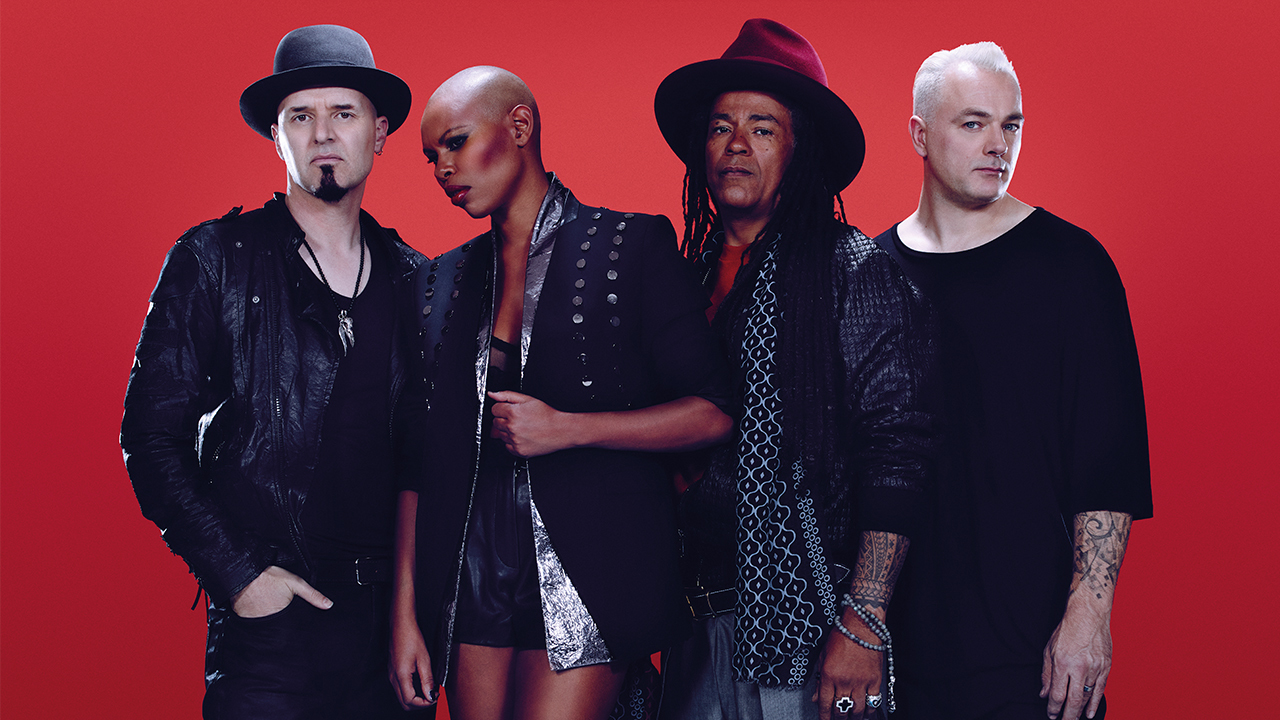You can trust Louder
In their 1990s prime, Skunk Anansie offered an exhilarating ‘clit rock’ alternative to the white boy-dominated ranks of Britrock. Two decades later, they remain a rare beacon among UK bands, a multiracial pop-metal quartet with a gay black female singer.
Of course, being different is no automatic measure of quality, and some of the band’s recent output has been decidedly pedestrian. But their main weapon of mass seduction is still frontwoman Skin, who has the brittle charisma of Grace Jones and Sinéad O’Connor combined: a potent mix of glamour, ferocity and vulnerability.
Re-forming in 2009 after almost a decade away, Skunk Anansie’s second act has already generated two albums, neither reclaiming the peaks of their 1990s heyday. Anarchytecture is another uneven ride, but it plays to their strengths more than its 2012 predecessor Black Traffic.
In truth, Skunk Anansie never sounded comfortable as hard rockers. Skin has a powerful voice, but it’s ill-suited to the overheated aggression of heavy guitar music, forever straining towards more arty and soulful terrain. The weakest tracks on Anarchytecture are the most conventional, like Beauty Is Your Curse or Death To The Lovers, soft-rock power ballads with a light sprinkling of metal.
The band pack more conviction when they open up to their broader musical tastes, as on the prowling disco-rockers Love Somebody Else and In the Back Room, bass-heavy funk workouts with libidinal lyrics about same-sex lust. Or the huge-sounding Victim, which begins with hard-churning riffs and climaxes in octave-vaulting, multi-layered vocals. There are pleasing echoes here of classic Queen, not just in their operatic melodrama but also the lean funk-metal grooves of their underrated Hot Space period.
Skunk Anansie find their groove in the album’s latter half with arena-sized anthems like Bullets, a gnarly funk-rock bruiser which erupts into a landslide of guitars and voices. Without You swells from reggae-flavoured foundations into an impassioned crescendo, with Skin weeping and wailing as the storm breaks, while We Are The Flames is a nu-metal beast with histrionic, Muse-ish overtones.
Closing with the tender confessional ballad I’ll Let You Down, Skunk Anansie’s sixth album wears its musical diversity and its queer sexuality like badges of pride. And so it should. Like Queen or Muse, they’re at their best when they push beyond the narrow centre ground of hard rock in search of something bigger, stranger and more glamorous.
Sign up below to get the latest from Classic Rock, plus exclusive special offers, direct to your inbox!
FINAL VERDICT: 7⁄10
Stephen Dalton has been writing about all things rock for more than 30 years, starting in the late Eighties at the New Musical Express (RIP) when it was still an annoyingly pompous analogue weekly paper printed on dead trees and sold in actual physical shops. For the last decade or so he has been a regular contributor to Classic Rock magazine. He has also written about music and film for Uncut, Vox, Prog, The Quietus, Electronic Sound, Rolling Stone, The Times, The London Evening Standard, Wallpaper, The Film Verdict, Sight and Sound, The Hollywood Reporter and others, including some even more disreputable publications.


